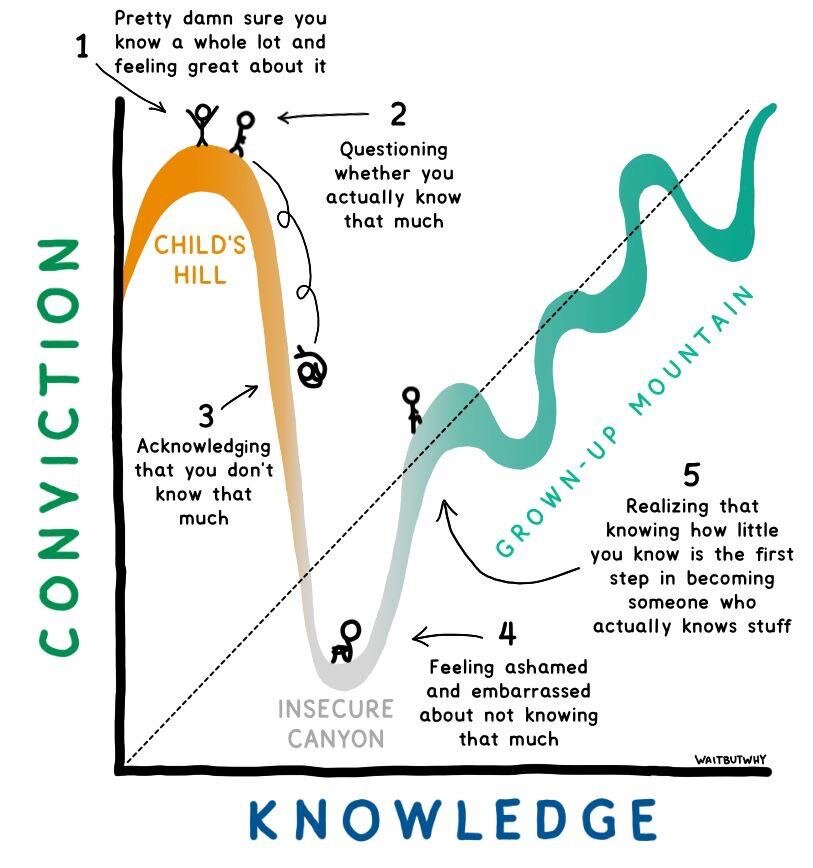I'm Smart Enough to Know I'm Dumb
“I’m smart enough to know I’m dumb” - Richard P. Feynman
At first glance, the phrase “I’m smart enough to know I’m dumb” might sound contradictory. In reality, it conveys a meaningful truth about intellectual humility and the path to self-improvement. This idea aligns closely with the wisdom of Richard Feynman—one of the most renowned physicists of the 20th century—as well as with the teachings of Stoicism and the practices of other great thinkers. By recognizing our limitations, we can unlock our potential, leading to greater wisdom, intelligence, and personal growth.
Embrace Your Ignorance
Richard P. Feynman, celebrated for his ability to simplify complex ideas, often emphasized the importance of acknowledging what we don’t know. He famously said:
“The first principle is that you must not fool yourself—and you are the easiest person to fool.”
For Feynman, the foundation of knowledge lay in intellectual humility: the willingness to admit gaps in understanding and to approach learning with curiosity rather than ego.
Feynman’s “Learning Technique” exemplifies this philosophy:
- Choose a concept and explain it as if you were teaching a beginner
- Identify the gaps in your understanding where your explanation falls short
- Return to the source material, refine your knowledge, and simplify further
By continually acknowledging what he didn’t know, Feynman grew both smarter and more effective at communicating complex ideas. This method shows us that an awareness of our own ignorance is a crucial step toward becoming wiser.
“If you can’t explain it simply, you don’t understand it well enough.” – Albert Einstein
One of my favourite Feynman videos
Stoicism: The Art of Wisdom Through Humility
The Stoic philosophers—particularly Marcus Aurelius, Seneca, and Epictetus—emphasized the importance of understanding one’s limitations and accepting the world as it is. In Meditations, Marcus Aurelius wrote,
“If anyone can refute me—show me I’m making a mistake or looking at things from the wrong perspective—I’ll gladly change. It’s the truth I’m after, and the truth never harmed anyone.”
This perspective reflects his commitment to continual self-improvement. By admitting we don’t have all the answers, we free ourselves from the need to be right all the time. Openness to learning from others, failures, and life’s challenges makes us more resilient, adaptable, and ultimately wiser.
Stoicism also emphasizes the “dichotomy of control”—focusing on what we can control (our actions and attitudes) and accepting what we cannot. Instead of wasting energy pretending to know everything, we should channel our efforts into learning and growing in areas where we have influence.
“The measure of intelligence is the ability to change.” – Albert Einstein
The Dunning-Kruger Effect
Psychologists David Dunning and Justin Kruger demonstrated that those with limited knowledge often overestimate their competence, while those with greater expertise are more likely to doubt themselves.
This phenomenon, known as the Dunning-Kruger effect, underscores the importance of intellectual humility. Ironically, recognizing that you’re “dumb” (or, more accurately, aware of your knowledge gaps) helps you avoid the traps of overconfidence.
It motivates you to seek new information, ask better questions, and engage with diverse perspectives—leading to smarter decisions and deeper insights.
“It is the mark of an educated mind to be able to entertain a thought without accepting it.” – Aristotle

Challenging Your Beliefs
Approaching debates and discussions with the mindset “What can I learn from this?” rather than “How can I change their mind?” transforms confrontation into curiosity. This shift fosters honest dialogue, where differing perspectives become opportunities to refine your ideas and identify potential blind spots.
I’ve noticed here in Canada, many shy away from debates for fear of conflict, adopting this mindset can help break free from intellectual echo chambers. Engaging with opposing viewpoints tests your beliefs, prompting you to refine them through critical scrutiny rather than clinging to untested assumptions.
Put your ego aside. Approach every conversation as a chance to learn, not win. Real growth occurs when you’re willing to recognize that your perspective may have weaknesses. By listening openly and without defensiveness, you allow your ideas to evolve and strengthen, while building mutual respect and understanding. The truly wise aren’t those who cling desperately to their views but those who adapt them in the face of better evidence or reasoning.
Some of the smartest and most successful people I’ve met prioritize listening over talking. They understand that wisdom emerges from absorbing diverse perspectives, asking thoughtful questions, and seeking to understand rather than dominate. Listening allows you to uncover opportunities, learn from others’ experiences, and refine your own ideas. It’s not about proving yourself the smartest person in the room; it’s about becoming smarter through active, attentive engagement.
“Humility is not thinking less of yourself, it’s thinking of yourself less.” – C.S. Lewis
How to Apply These Principles in Life
Embrace Intellectual Humility
- Acknowledge what you don’t know and admit when you have gaps in understanding
- Remember Feynman’s first principle: don’t fool yourself, and recognize that self-deception is easy
- Use the Feynman Technique: try teaching a concept in simple terms, identify where you stumble, then revisit and refine your understanding
Adopt a Growth Mindset
- Treat challenges, setbacks, and even “failures” as opportunities to learn rather than threats to your ego
- Remain open to correction—seek truth, not validation
- If someone proves you wrong, embrace the new insight rather than clinging to outdated beliefs
Focus on What You Can Control
- Follow the Stoic dichotomy of control: invest energy in developing your skills, habits, and attitudes, rather than worrying about external factors beyond your influence
- Recognize that intellectual humility and resilience come from accepting that you can’t know or control everything
Stay Open to Diverse Perspectives
- Challenge your assumptions by engaging with different viewpoints. Approach conversations and debates with genuine curiosity, asking, “What can I learn here?” instead of “How can I win?”
- By welcoming contrasting ideas, you’ll expose blind spots, avoid the Dunning-Kruger effect, and continuously refine your understanding.
Listen More, Talk Less
- Prioritize listening to understand rather than speaking to impress. The smartest people learn from others, drawing on their experiences and insights.
- Engage with those who challenge your perspective. By doing so, you not only deepen your knowledge but also cultivate empathy, respect, and stronger reasoning skills.
Continuously Seek Knowledge
- Read widely across different fields and philosophies to broaden your horizons.
- Embrace a lifelong learning mindset. The moment you believe you have all the answers, you close off the path to further growth.
“Some people die at 25 and aren’t buried until 75.” - Benjamin Franklin
Grow Through Humility
Success—whether personal or professional—isn’t about being the smartest person in the room. It’s about being adaptable, teachable, and resourceful. By acknowledging our limitations, we open ourselves to learning, collaboration, and growth. We learn to value the process of discovery over any illusion of perfect knowledge.
The greatest thinkers teach us that true wisdom isn’t found solely in accumulating facts. It’s found in understanding how much more there is to learn. When you’re “smart enough to know you’re dumb,” you take the first step on a lifelong journey of self-improvement and intellectual growth.
“True knowledge exists in knowing that you know nothing.” – Socrates
